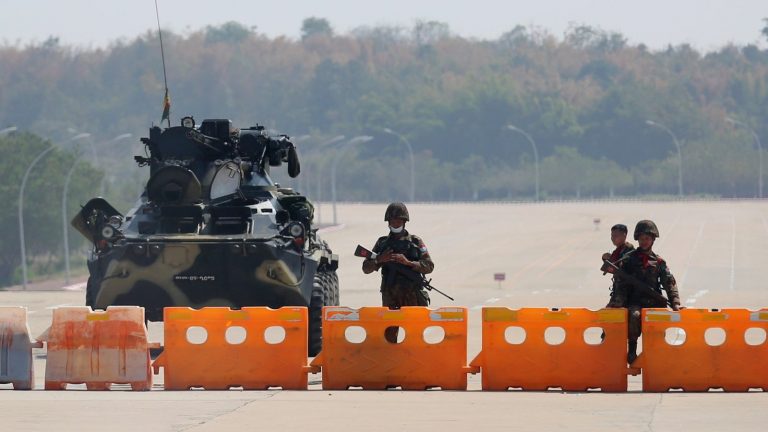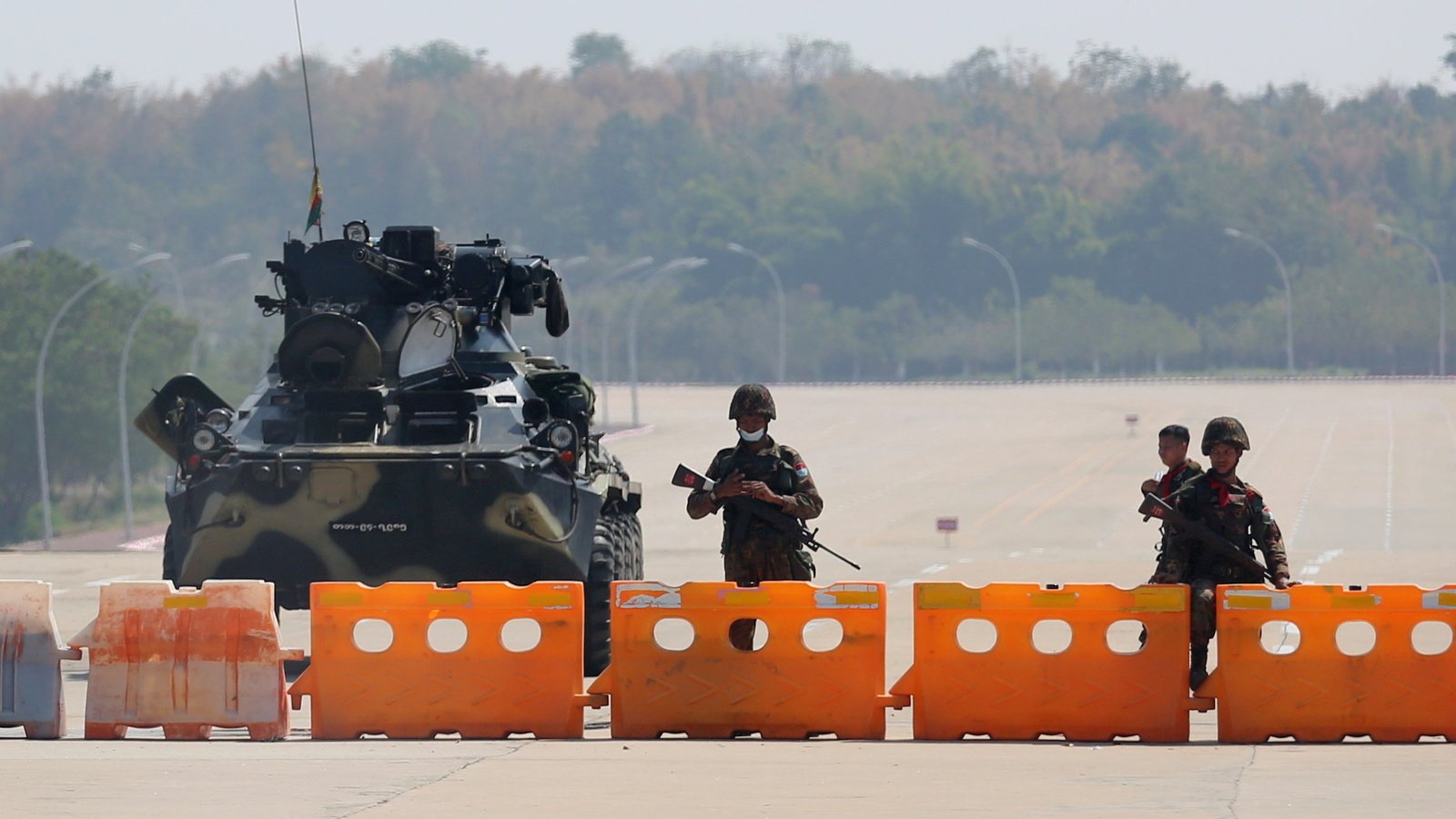
 The military claimed the election had been “stolen”. They tried to bully the electoral commission into reversing the result. When that failed they marched on parliament. Sound familiar so far? Backed up with tanks and guns, the generals arrested the NLD politicians and returned Aung San Suu Kyi to house arrest.
The military claimed the election had been “stolen”. They tried to bully the electoral commission into reversing the result. When that failed they marched on parliament. Sound familiar so far? Backed up with tanks and guns, the generals arrested the NLD politicians and returned Aung San Suu Kyi to house arrest.
By Tom Arms
This week’s coup in Myanmar (aka Burma) is a warning of the dangers of Faustian pacts between politicians and the military.
To be fair, the political maneuverability of human rights icon Aung San Suu Kyi was severely limited. Her country had been under a brutal military regime for nearly half a century when she started talks with the generals. And she was negotiating while under house arrest.
But the government which eventually resulted in multi-party general elections in 2015 and again last November was neither political fish nor fowl and thus inherently unstable. The Tatmadaw (the military’s name for itself) called the result a “discipline-flourishing democracy.”
The new constitution allowed multi-party elections, but 25 percent of the seats were reserved for the military’s political vehicle the Union Solidarity and Development Party (USDP); which had a blocking vote because major legislation required a three-quarters majority.
In addition, the cabinet portfolios of defence, border security and home affairs were held by serving military officers. The military also appointed two of the vice presidents. Ms. Suu Kyi was specifically barred from the presidency by constitutional clause which said no one married to a non-Burmese citizen or who had non-Burmese children could hold the top job. Aung San Suu Kyi was married to a British subject and had British children.
The generals were the real power in the land. The problem was that they craved political legitimacy; and Aung San Suu Kyi and her National League for Democracy (NLD) repeatedly thwarted them by winning landslide victories. The latest was in November when the NLD secured 86 percent of the elected seats in parliament. The USDP won a derisory seven percent.
The military claimed the election had been “stolen”. They tried to bully the electoral commission into reversing the result. When that failed they marched on parliament. Sound familiar so far? Backed up with tanks and guns, the generals arrested the NLD politicians and returned Aung San Suu Kyi to house arrest.
The generals had hoped that blocking Ms. Suu Kyi from the presidency and her lack of government experience would lead to her failure that would strengthen the USDP. She started by confounding them over the leadership issue. Barred from the presidency, Ms. Suu Kyi created the post of “state counsellor” which she said was above the presidency.
But the generals appeared to be right in Aung San Suu Kyi’s lack of government experience. She failed miserably to negotiate an end to the long-standing civil wars which has plagued the country since 1948, with several ethnic factions fighting the dominate Burmese-speakers for autonomy or outright independence.
The ethnic problem was highlighted by Ms. Suu Kyi’s failure to control the Tatmadaw from waging virtual genocide against the Rohingya Muslims. Her defence of the Burmese military before the International Court of Justice caused Ms. Suu Kyi to fall from the human rights pedestal on which Western liberals had placed her.
Suu Kyi’s handling of the economy was too little too late. Under her government the economy grew at about 6.5 percent a year, but it needed growth of well over 10 percent to make up for decades of mismanagement.
Before independence in 1948, Burma was one of the richest countries in Asia. The country was—and still is—awash in oil, natural gas, minerals and precious gemstones. But its long and repressive military dictatorship resulted in sanctions, lack of foreign investment and international isolation which destroyed the colonial economy. Myanmar’s per capita income is £1,298 per annum compared to $6,502 in neighboring Thailand.
All this led the military to believe that they had a chance of at the very least making a substantial dent in the NLD’s substantial majority in the elected parliamentary seats. But the November elections only increased the NLD’s position. Democracy had failed the generals, so they staged their coup, put Aung San Suu Kyi back under house arrest and returned to the tried and tested military dictatorship.
 World Review
World Review
Move over Donald Trump. America’s conspiracy-driven ultra-right has a new darling. She is the photogenic 46-year-old freshman Congresswoman from Georgia Marjorie Taylor Greene. In less than a month in office, Ms. Greene has infuriated Democrats, embarrassed the Republican leadership, made Trump look like a wet liberal, shot to media prominence, sparked a movement to force her expulsion from the House of Representatives, and won the hearts of White supremacists. Ms. Greene hit the hallowed corridors of Congress running. The day after she was sworn in she filed articles for the impeachment of President Biden. But it is her record of conspiracy-laden Trumpism before officially taking office that has done Ms. Greene the most damage (or help). Obama is a secret Muslim. Mass shootings were false-flag exercises designed to undermine gun rights. Bill Clinton murdered John F. Kennedy Jr. Hillary Clinton is a pedophile. Nancy Pelosi should be executed for treason…. Leading Democrats have called for her expulsion from Congress. They won’t succeed and that, but they have blocked her appointment to committees. However, the Democratic ire seems to only encourage the Republican grassroots to rally around Ms. Greene, especially after Trump declared: “I love her.” One thing is certain: The fate of Marjorie Taylor Greene is now tied to the future direction of America’s Republican Party.
- Britain did not, on 1 January, fall off the economic cliff as some anti-Brexiteers predicted. But neither has the country’s formal departure from the European Union been an economic walk in the park. Red tape at borders has meant bureaucratic headaches, especially for anyone supplying perishable products such as fish, meat, vegetables and some medicines. Particularly hard hit has been Northern Ireland which now has an open border with Eire and a hard border with the rest of the United Kingdom. The border, however, can be closed by either the UK or EU if either party has reason to believe that the agreement causes “economic, societal or environmental difficulties.” The commission briefly closed the border to stop the export of coronavirus vaccines. It was a stupid move which was immediately rescinded. Now the pro-Unionist Democratic Unionist Party (DUP) is calling for the border to be closed and the UK/Northern Ireland border to be thrown open to alleviate the trade in fresh food from the UK to Northern Ireland. But closing the border between North and South Ireland would breach the Good Friday Agreement which is the foundation of the fragile peace in Northern Ireland. A predicted Brexit conundrum.
- There is no doubt that Alexei Navalny is a brave man and a hero to thousands of Russians demonstrating for his release from prison. Navalny also receives a favorable press outside of Russia. But beware he is not the cuddly politician one might think. He is an anti-immigration, xenophobic ethnic Russian nationalist. In 2013 he defended anti-immigration riots in Moscow. He supported Putin’s annexation of the Crimea and has campaigned for the political integration of Russia with Ukraine and Belarus. Navalny has also supported Russian secessionists in Georgia and Moldova and attacked the building of Moscow’s first mosque in 2015. The major difference between Alexei Navalny and Vladimir Putin is the former’s campaign against the oligarchical-controlled corruption that is dragging down the Russian state.
- The good news is that this week the US and Russia signed a new five-year Strategic Arms Reduction Treaty (START) which cuts the nuclear arsenals of the two countries. The bad news is that Russia withdrew from the 1992 Open Skies Treaty which allowed the US, Europe and Russia to conduct aerial surveillance of each other’s military installations. The US withdrew in November. The treaty is dead. That is a concern. The Russians say they withdrew because of Donald Trump’s withdrawal. But it is not that simple. Trump withdrew because the Russians were blocking surveillance flights, especially over the heavily-armed Russian enclave of Kaliningrad which is sandwiched between the Baltic States and Poland. In making the announcement, President Vladimir Putin said the door was ajar for a renegotiated Open Skies Treaty. But this seems unlikely in the immediate future because President Trump scrapped the specially-equipped planes needed to enforce the treaty. The end of Open Skies is particularly worrying when considered in the context of the end of the Intermediate Range Nuclear Forces (INF) Treaty which regulated the nuclear weapons regime based in Europe. START lessens the danger of an intercontinental nuclear exchange. But the demise of the INF Treaty and the Open Skies Agreement increases the possibility of hostilities in Europe.
- Britain plans to join the Trans Pacific Partnership (full name Comprehensive and Progressive Trans-Pacific Partnership, AKA CPTPP). This is a bit surprising because the agreement is a trading bloc of countries bordering the Pacific Ocean. Britain now has only one possession in the Pacific—Pitcairn, population 50. It does, however, have historic and cultural links throughout the region. The main reason for the British application for membership of the TPP is to curry favor with Washington. One of the main reasons Obama devised the TPP was to block against Chinese economic expansion. For the first 18 years of the 21st century successive British governments have curried favor with the Chinese, in the hope that economic liberalization would lead to Chinese democratization. Whitehall have reluctantly admitted this is a lost cause and are now falling in behind the Trump/Biden tougher stance on Beijing. The TPP also offers a back door trade agreement with the US–a key target of UK foreign policy since the Brexit referendum. It would not be as good as a bilateral deal, but it could be something on which a bilateral arrangement could be constructed.
- Apologies to Russia’s scientists and President Vladimir Putin. I was skeptical of their coronavirus vaccine Sputnik V. This was understandable given that the vaccine was tested on only 76 volunteers before being approved and rushed into production. However, the Russian gamble appears to have paid off. A peer-reviewed article in The Lancet shows that Sputnik V is 91 percent effective in combatting the virus. On top of that, the Russians are about to launch two more vaccines—Epivac and Covivac. This is great news because the world desperately needs as many countries as possible manufacturing as many vaccines as possible to jab as many arms as possible as quickly as possible. So far 15 countries have ordered a billion doses of Sputnik V. The Russian vaccine is even being considered by the European Union to make up for the shortfall in BioNtech and Astra Zeneca doses. Unfortunately, the Russians are a bit slow on distribution. They are hoping to counter this with partnership agreements to produce their vaccines in different countries.
- There is more good news on the vaccine front. British health officials reported that the vaccines are having an effect on reducing transmission rates as well as providing immunity. Officials have also said that spacing the two necessary jabs 12 weeks apart actually improves the efficacy of the vaccines. Taking this route was a British government gamble as researchers originally wanted the jabs to be two weeks apart and refused to vouch for the effectiveness of the vaccine if it was administered at 12-week intervals. Also, scientists report that tweaking the vaccine to deal with mutant strains will be a fairly simple operation. And finally, the Astra Zeneca vaccine can be mixed and matched with the Russian offering to increase doses. Russian and British research scientists are in talks about details.
- Underneath Warsaw’s Vistula River is a bank of computers hooked up to…clams. The mollusks are the latest in anti-pollution devices. And these particular clams are monitoring the safety of Warsaw’s drinking water. A coil runs between a computer and a magnet inside the clams. Water is then run past the clams who have a strong aversion to pesticides, heavy metals and other pollutants. When exposed to these nasties they literally “clam up”. The movement is picked up by the magnet which in turn is connected to a computer which tells the engineers to start cleaning.
__________________
About the Author
 Tom Arms is the London-based American foreign affairs journalist. He has nearly half a century’s experience of world affairs, and has written and broadcast for American, British and Commonwealth outlets. Positions he held included foreign correspondent, diplomatic correspondent, foreign editor, editor and founding CEO of an international diary news service. He is the author of “The Encyclopedia of the Cold War,” “The Falklands Crisis” and “World Elections on File.” His new book “America: Made in Britain” is expected this year.
Tom Arms is the London-based American foreign affairs journalist. He has nearly half a century’s experience of world affairs, and has written and broadcast for American, British and Commonwealth outlets. Positions he held included foreign correspondent, diplomatic correspondent, foreign editor, editor and founding CEO of an international diary news service. He is the author of “The Encyclopedia of the Cold War,” “The Falklands Crisis” and “World Elections on File.” His new book “America: Made in Britain” is expected this year.
{The views expressed in this article belong to the author and do not necessarily reflect the editorial policy of Sindh Courier}